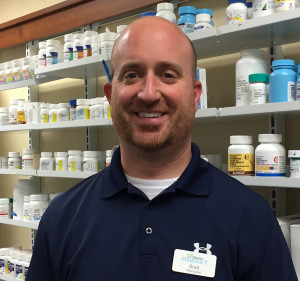
FEATURE — As we age, our health often declines and in turn more medicines are needed. About 3 of every 4 people over 65 have more than one chronic health problem, according to a study by the Robert Wood Johnson Foundation. At this stage of life, it’s common to take many different drugs.
Many struggle keeping track of more than one drug. The way your body responds to medicines can also change as you age. Challenges like these may explain why 1/3 of hospitalizations among older patients are due to drug-related problems.
Communicating well with your doctor and your pharmacist can help you stay safe and ensure your drugs work the right way. Each person’s situation is unique, so get the personal attention you deserve. Ask your pharmacist any questions you may have. In the meantime, here are some ways to manage common challenges you may face:
1. Multiple medicines | It helps to use one pharmacy for all your prescriptions and refills. That way, they can check for potential interactions between your medications, and suggest supplements that would be safe for you to take along with those drugs. Bring in a list of all your prescription and over-the-counter medications as well as any vitamins and supplements. Discuss ways to synchronize or simplify your medication schedule with your pharmacist. If you notice any side effects, tell your doctor and pharmacist right away. This can be a reaction to a drug or a combination of drugs. It may also be due to an interaction with alcohol or certain foods.
2. Forgetfulness | You may find it helpful to write down your medication schedule. Note the day and time to take each drug, and what it’s for. Include special instructions such as whether to take the drug with food and where to store it. Special pill boxes may also help. Also, set a daily routine and tie it to another well-ingrained habit. For example, if you need to take a medication at night, keep those pills near your toothbrush.
3. Cost | On fixed incomes, many older adults are concerned about the high cost of medications. First of all, know that skipping doses or not filling your prescription is not a safe solution. You need to take the drug exactly as directed. Talk to your pharmacy about ways to reduce costs. For example, see if a generic version of your drug is available, or if you are eligible for a prescription assistance program. Also, ask your insurance company if you can get a senior citizen discount. Before filling a prescription, your doctor may have free samples available. This isn’t a long-term solution, but it does let you try out a drug for free to see if it works without a lot of side effects.
4. Swallowing or dexterity problems | Do you have trouble swallowing pills or opening pill bottles? Have your pharmacist help you come up with a solution. For example, easy-to-open containers (if there are no children in your home) or taking a liquid medicine instead of pills. Always check with your pharmacist first before chewing or crushing tablets.
Related posts
- Family struggles to pay son’s medication costs; highlights ‘specialty drug’ woes; STGnews Videocast
- What’s that smell, Fido? Dental health issues go untreated in pets
- Pharmaceutical compounding offers alternatives to stretch mark, scar, pain treatment
- Health department, Zion National Park investigate tuberculosis case
- Trouble for Healthy Utah: Committee votes in favor of opposing ‘Utah Cares’ proposal
- Q&A with pharmacy technician on compounding medications
- Police link man arrested for armed robbery to previous pharmacy robbery
- Man tries 3 times to fill fake prescription, arrested at 3rd pharmacy
- Hometown friendly, state-of-the-art, Stapley Family Pharmacy

Written by Brad Stapley for St. George Health and Wellness magazine and St. George News.
Brad Stapley is a second generation pharmacist at Stapley Pharmacy. He graduated from Roseman University in 2004 and specializes in navigating the pharmacy and prescription challenges.
St. George Health and Wellness website
Email: [email protected]
Twitter: @STGnews
Copyright St. George News, SaintGeorgeUtah.com LLC, 2015, all rights reserved.